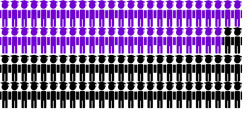Beginning in the fall of 2014, Willow Hall, an on-campus residence hall, will be reserved for fraternity and sorority members. Through an application process, the suite-style dormitory building will be open for sophomore Greek life members and have potential space for juniors as well.
Jon Buchalski, Assistant Director of Student Activities for fraternity and sorority life, notified the Greek life community of this transition by email on Monday, Feb. 17.
According to Buchalski, the application process will allow members of the Greek life community to apply for the different suites available in the building. He said the first priority will be to fill the building with as many rising sophomore members as possible.
“Our goal is to give a suite to each group before allowing any organization a second suite,” said Buchalski. If one organization cannot provide enough members to fill a suite, Buchalski said another Greek organization can claim multiple suites. Since the primary goal is to fill all of the suites, an organization that can only fill half a suite will be placed lower on the priority list.
If an organization is granted a half suite, however, they will have the option to pull in students of their choice, or residential life will coordinate roommates for them. Buchalski said, though, it is not in his plan to combine fraternities and sororities with multiple organizations in single suites.
Raymond Gonzalez, Associate Director of Residential Life, said, “I think that it can benefit the Greek life community to further build relationships between organizations and with the University. Having the opportunity to share a living space and hopefully share in some sort of community governance of the building will help strengthen the organizations.”
Michelle Melzl, a brother of Alpha Kappa Psi (AKPsi) business fraternity and a sister of the Alpha Omicron Pi (AOII) sorority, believes the Greek-only dormitory building will benefit and possibly encourage students to become involved with fraternities or sororities. The senior health studies student said, “I think it will provide [students] with a better sense of what Greek life is about and give them the picture of it being more of a community.”
Griffin Martin, brother of Tau Kappa Epsilon (TKE) fraternity, is not as optimistic as Melzl. He said, “For a campus that wants to expand Greek life, even though being in an all-Greek building seems like a nice incentive to want to join, it takes away from recruitment by limiting the interaction of existing members and potential new members.”
Gonzalez reminded Greek members that in order to initially be considered as a potential resident of Willow Hall, housing deposits of $150 were to be submitted by Friday, Feb. 21. Upon receiving the housing deposits, applications to live in Willow Hall were accepted until March 7 at 5 pm.
Other factors that will be used in the application process to determine if an organization is eligible to live in Willow Hall include good standing with the Greek Senate, academic standing, and Greek Excellence Packet Score.
Ultimately, the decision as to which fraternity and sorority organizations will be granted the ability to live in Willow Hall will be determined by the Office of Residential Life. “There is no guarantee that every organization will be represented [in Willow Hall],” Buchalski said.
Both Buchalski and Gonzalez said if fraternities and sororities cannot fill the entire building, the University will open the suites to other students, however, both men are in agreement that there are more than enough members of Greek life who will be living on campus for the 2014-2015 year, so they do not believe this will be an issue. According to Buchalski, there are approximately 730 students involved in Greek Life.
“We have seen an increase in Greek life over the past three years. I see this as a piece of this progression,” said Mary Anne Nagy, Vice President for Student and Community Services.
Due to the University being able to guarantee housing for all first and second year students on campus, the idea to permit a Greeks-only residence hall was discussed in February to cater to this growing segment of the University’s population.
“With the addition of a new residence hall for next fall, we wanted to start to explore different thematic housing options that we could provide to our students,” Gonzalez commented.
Willow Hall was eventually chosen as the Greek residence building at the discretion of the Office of Residential Life because it is one of two sophomore suite-style buildings. Gonzalez said, “We still want to provide students who are not in a fraternity [or] sorority the opportunity to reside in a suite-style building, so we only are using one.”
Residence Assistants (RA) will be present in Willow Hall, and Buchalski would prefer to have RAs that are both affiliates and non-affiliates of Greek-life in order to create a balance.
The Head RA of Willow Hall will be a non-affiliated student, Chris Kelly. “I think it will be an interesting opportunity as this is the first time there will be this style of housing on campus,” said Kelly. “Since a sense of community is one of the most important factors will living on campus, I hope to develop an enhanced sense of community not only for the Greek students, but for the Monmouth community as a whole as well.”
Gonzalez believes Willow Hall may lower the potential for groups to move off-campus too early in their college career, with freshman and sophomores having their needs better served on campus.
When asked if Willow Hall is symbolic of and a first-step towards having a “Greek Row” (a concentrated area of fraternity and sorority houses) or University-sponsored off-campus housing, Buchalski responded that this pilot program has no relation. “The state of NJ and its individual towns have zoning laws and fire codes that prevent residential properties from becoming fraternity and sorority houses without the proper regulations,” he commented.
Jaelyn Tucker, a non-affiliated junior criminal justice major, supports Willow Hall being newly designated for those who bear Greek letters across their chests, although she thinks most non-Greek students will feel indifferent about it. She said, “I think [the University] is giving [Greek members] the option of being with more of their fellow Greeks… It is a nice thing to do for people who feel like part of a big family.”
In addition to Willow Hall, Buchalski plans to provide a better experience for the University’s fraternity and sorority members by offering more opportunities for students to get involved, increasing leadership roles in the community, being more sustainable, and creating connections to the values of all of the University’s organizations.
Melzl said, “I can truly say [being a member of Greek life] has been one of the best decisions I have ever made. It is more than just community service, Greek events, and socializing; it is having a home away from home. Greek life means always having someone to turn to for whatever you need. This experience has made my college experience unforgettable, and I think that’s something everyone deserves to have.”
PHOTO TAKEN by Brianna McCabe



